|
|
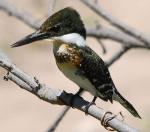
|
Green Kingfisher
|
Overview
Green Kingfisher: Small kingfisher, dark green head, back, and wings, white chin, collar, rufous breast band, white belly with black spots. Black bill is long and straight. Legs and feet are gray. Feeds mostly on small fish taken in dives and aquatic insects, amphibians. Direct flight. |
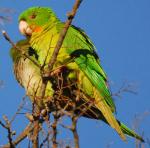
|
Green Parakeet
|
Overview
Green Parakeet: Fairly large all green parakeet, may show scattered orange or red feathers on breast. In flight the underside of flight feathers show metallic yellow and there may be scattered yellow feathers on leading edge of wing. Swift dirct flight on rapid wing beats, often high above terrain. |
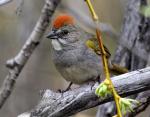
|
Green-tailed Towhee
|
Overview
Green-tailed Towhee: Large sparrow, olive-green upperparts and pale gray underparts. Crown is rufous, throat is white with black stripes, and bill is gray. Wings and tail are edged with olive-yellow. Rapid bouncy flight, alternates several quick wing beats with wings pulled to sides. |
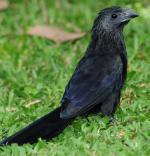
|
Groove-billed Ani
|
Overview
Groove-billed Ani: Medium-sized black bird with iridescent blue and green overtones, with a very long tail (half the length of the bird). Bill is huge, with arched ridge and narrow grooves. Feeds on insects, ticks, spiders, lizards, fruits, berries and seeds. Flies low to the ground. |
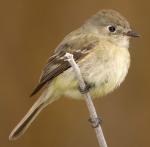
|
Hammond's Flycatcher
|
Overview
Hammond's Flycatcher: Small flycatcher, gray upperparts, gray-brown underparts, white eye-ring. Throat is pale gray, belly is pale yellow. Wings are dark with two pale bars. Feeds on insects. Black legs and feet. Weak fluttering direct flight with shallow wing beats. Sallies to take insects in air. |
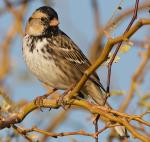
|
Harris's Sparrow
|
Overview
Harris's Sparrow: Large sparrow with dark-streaked, brown upperparts and white underparts with dark-streaked sides. Head has stark black crown, face, and throat. Gray cheek patch is marked by a thin, black line. Bill is pink. Alternates rapid wing beats with brief periods of wings pulled to sides. |
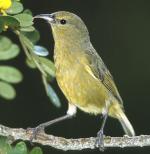
|
Hawaii Amakihi
|
Overview
Hawaii Amakihi: Also known as the Common Amakihi. Upperparts are yellow-green and underparts are yellow. Lores are black, bill is black and decurved. Wings and tail are olive-gray. Legs and feet are gray. Flight is strong and direct in the forest canopy, may undulate over long distances. |
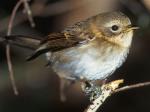
|
Hawaii Elepaio
|
Overview
Hawaii Elepaio: Small monarch flycatcher. Crown and back are brown, may have white or rufous forehead and eyebrow. Black throat may show some white. Underparts are white with a brown-streaked breast. Wingbars and rump are white, brown tail may have white-tip. Black bill, dark gray legs and feet. |
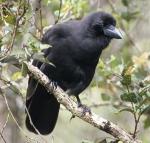
|
Hawaiian Crow
|
Overview
Hawaiian Crow: Medium crow, brown-black body, brown-tinged wings. Eyes are brown, bill is large and stout. Feeds on insects, fruit, carrion, eggs and young of other birds, and small animals. Direct flight on steady wing beats. Believed to be extinct in the wild. AKA 'Alala to the native Hawaiians. |
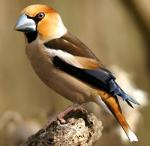
|
Hawfinch
|
Overview
Hawfinch: Stocky finch with a huge blue-gray conical bill that turns yellow in winter. Yellow-buff head, black chin, throat and mask, pink-buff underparts, dark red- brown upperparts, gray neck and white tipped brown tail. Eats large tree seeds, also eats fruits and insects. Swift bounding flight. |
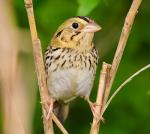
|
Henslow's Sparrow
|
Overview
Henslow's Sparrow: Small sparrow, black-streaked brown upperparts. Breast, sides, and flanks are dark-streaked pale buff; throat and belly are white. Head is olive-brown with dark lines. Weak fluttering flight with tail jerking, alternates rapid wing beats with wings pulled to sides. |
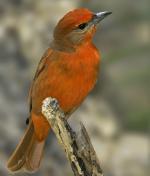
|
Hepatic Tanager
|
Overview
Hepatic Tanager: Large tanager, dark to orange-red overall, gray wash on back and flanks. Gray-red cheek patch. Heavy, dark bill is slightly hooked. Legs and feet are gray. Forages in upper foliage of trees, sometimes catches insects in midair. Swift direct flight on rapid wing beats. |
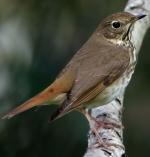
|
Hermit Thrush
|
Overview
Hermit Thrush: Small thrush, with olive-brown to red- or gray-brown upperparts, black-spotted white underparts and rufous tail. Distinct white eye-ring. Pink legs, feet. Swift direct flight, may hover briefly over prey. Considered to have one of the most beautiful songs of all North American birds. The state bird of Vermont. |
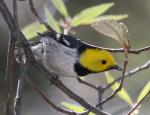
|
Hermit Warbler
|
Overview
Hermit Warbler: Small warbler, gray upperparts, white underparts, black-streaked flanks. Head is yellow with black throat and nape. Wings are gray with two white bars. Bill, legs and feet are black. They spend most of their time in the tops of tall fir and pine trees, making them difficult to see. |
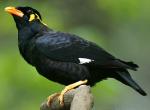
|
Hill Myna
|
Overview
Hill Myna: Large, stocky, glossy black starling with bright orange bill, unique fleshy lobes of bright yellow skin behind and below eyes, and prominent white wing patch. Yellow legs and feet. Extremely vocal, mimics other birds. It is a popular cage bird, renowned for its ability to imitate speech. |
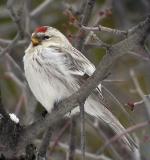
|
Hoary Redpoll
|
Overview
Hoary Redpoll: Small finch (exilipes), buff-gray, brown-streaked upperparts and brown-streaked white underparts washed pink. Head has red cap, black chin patch. Black wings with two white bars. Rump is pale gray or white with few or no streaks. Black tail is notched. Black legs and feet. |
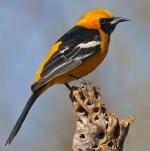
|
Hooded Oriole
|
Overview
Hooded Oriole: Medium oriole with bright orange-yellow head and nape, and black back, face, throat, and upper breast. Bill is slightly decurved. Black wings have two white bars. Tail is black. Forages in trees and bushes. Eats insects, caterpillars, and nectar. Strong direct flight. |
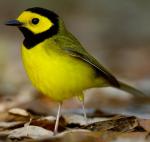
|
Hooded Warbler
|
Overview
Hooded Warbler: Medium warbler, olive-green upperparts, bright yellow underparts. Head has black hood, and yellow face. The eyes are large and dark and the tail is often spread, displaying large white spots. Bill is black, legs and feet are pink. Makes short, direct flights on rapidly beating wings. |
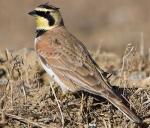
|
Horned Lark
|
Overview
Horned Lark: Medium-sized lark with pale or dark brown upperparts and white underparts. Face and throat are pale yellow to white and mask, cap, and ear tufts are black. Tail is dark with white edges. Forages on ground, usually in open fields. Eats seeds, grains, insects and small mollusks. |
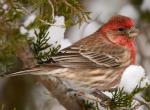
|
House Finch
|
Overview
House Finch: Medium-sized finch with brown-streaked back and wings, and brown-streaked white underparts. Head, throat, and rump are typically pink-red; yellow to orange variants may occur. Tail is relatively long and weakly notched. Bill is short and slightly decurved. Feeds mostly on seeds, takes some insects and fruits. Swift bounding flight. |
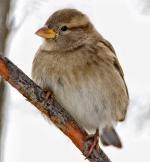
|
House Sparrow
|
Overview
House Sparrow: Medium-sized, stocky sparrow with black-streaked brown upperparts and pale gray underparts. Wings are brown with single white bar. Cheeks and crown are pale gray, contrasting with black throat, upper breast, and bill. Legs are shorter and black bill is thicker than in native sparrows. |
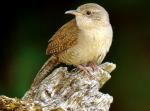
|
House Wren
|
Overview
House Wren: Small wren (western parkmanii), with brown head, nape, and back showing very fine dark brown bars, faint white eyebrows, and gray-brown underparts with fine brown bars on flanks and below tail. Wings and tail are brown with darker bars. Bill is thin and slightly decurved. |
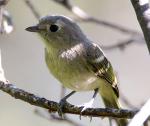
|
Hutton's Vireo
|
Overview
Hutton's Vireo: Small vireo, olive-gray upperparts, buff to yellow underparts. Eye ring is white, broken above eye. White undertail coverts. Wings are dark with two white bars. Gray bill is short and thick. Legs, feet are blue-gray. West Coast birds have greener upperparts then southwestern birds. |
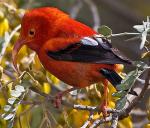
|
Iiwi
|
Overview
Iiwi: Vibrant red plumage overall with black wings and tail. Wings show contrasting white patch on inner secondaries. Salmon-colored bill is long and decurved. Undulating flight, alternates several rapid wing beats with wings pulled to sides. Wings produce a characteristic whirring noise in flight. |
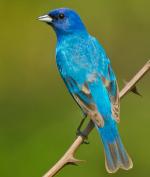
|
Indigo Bunting
|
Overview
Indigo Bunting: Small finch with brilliant, almost iridescent, blue plumage. Crown is darker blue with a purple tint. Wings and tail are black with blue edges. Feeds on insects, larvae, grains, seeds, berries. Short flights low over vegetation, alternates rapid wing beats with wings pulled to sides. |
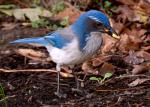
|
Island Scrub-Jay
|
Overview
Island Scrub-Jay: Medium-sized, crestless jay with gray-brown back and blue wings. Upper breast, throat, and chin are white with streaks. Head is blue with gray mask and narrow white eyebrow. Tail and undertail coverts are blue. Forages on ground. Flies with steady bouyant wing beats. |
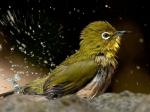
|
Japanese White-eye
|
Overview
Japanese White-eye: Small and active, this introduced songbird has olive-green upperparts and a prominent white eyering. Chin, throat and undertail coverts light yellow, belly off-white with dusky wash on sides and flanks. Gray wings and tail are outlined in green. Legs, feet, and bill are black. |
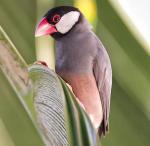
|
Java Sparrow
|
Overview
Java Sparrow: Largest member of the Estrildid family. Gray upperparts and breast, belly is brown-gray to pink, undertail coverts are white. Head is black with large white cheek patch, narrow red eyering, thick, cone-shaped pink bill. Black tail, pink legs, feet. Fast flight on rapidly beating wings. |
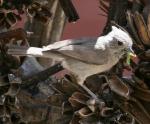
|
Juniper Titmouse
|
Overview
Juniper Titmouse: Small titmouse with gray upperparts, paler underparts, and plain gray, crested head. Tail is long and dark. Along with the Oak Titmouse, was known as the Plain Titmouse until 1996, when they were shown to be seperate species due to differences in song, habitat, and genetic makeup. |
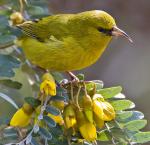
|
Kauai Amakihi
|
Overview
Kauai Amakihi: Small honeycreeper, olive-green above and pale yellow to creamy gray below. Face has brown lores and pale yellow supercillium. Pale yellow chin and throat, gray wings and tail. Gray bill is decurved. Gray legs, feet. One of the least specialized and most adaptable Hawaiian species. |
|
|